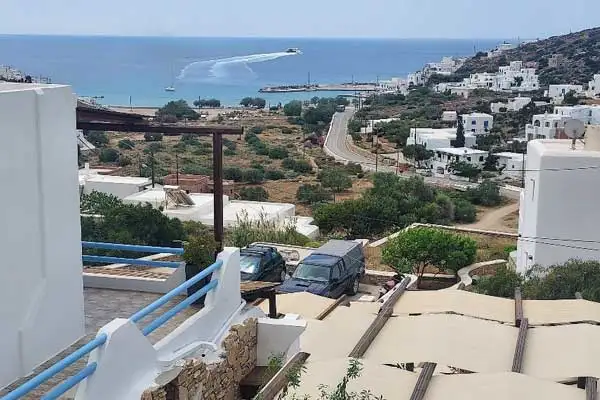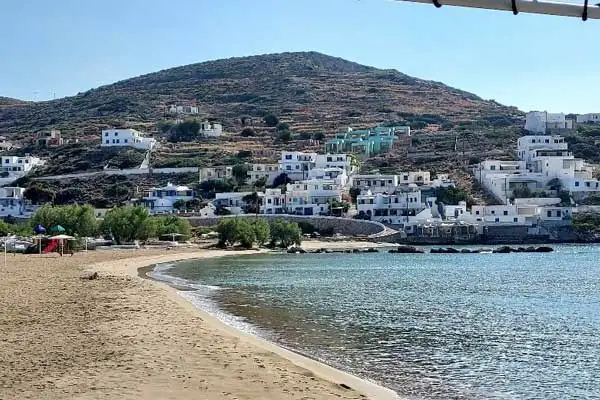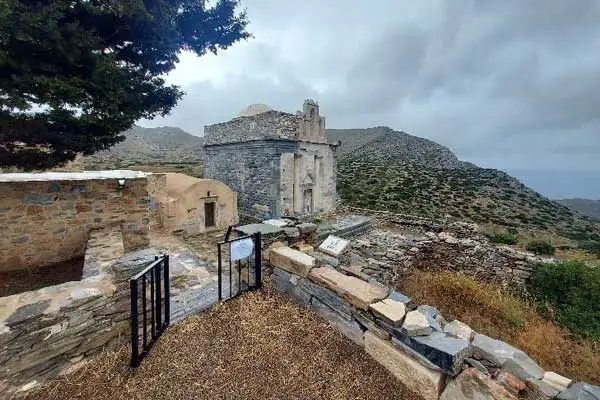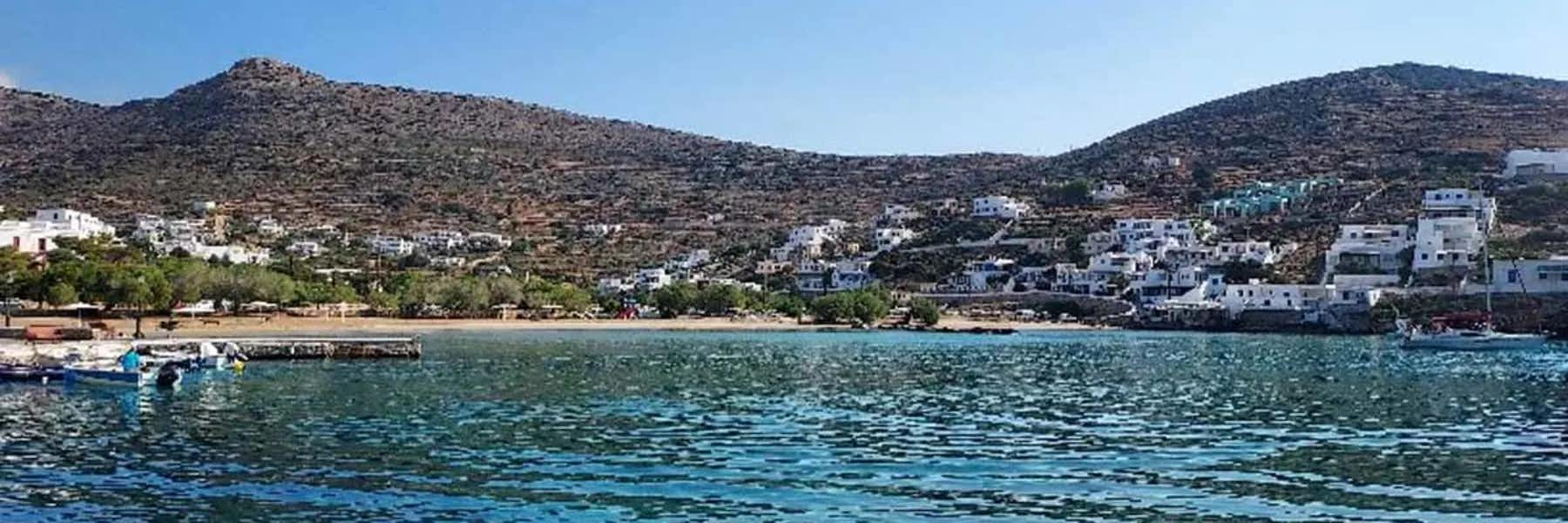Upon approach, Sikinos pierces the otherwise unbroken plain of the coursing sea. Its harsh terrain is a jumble of arid granite rocks, beautiful and stark against the deep royal blue waters of the Aegean. As we draw closer, the bay opens up into a glorious sandy beach, the shallow water crystal clear. The land rises quickly from the sea to create a stunning amphitheater effect, with the ubiquitous, white-washed cubic Cycladic houses scattered across the land.
Sikinos is one of the lesser known of the 24 inhabited islands that comprise the Cyclades, in the center of the Aegean Sea. The famous names of Mykonos, Paros, Naxos, Syros, and Santorini form the nucleus of what has become a Mecca for tourists from all over the world.
Very quiet, and distinctly traditionally Greek, Sikinos is one of the most ruggedly beautiful islands in the Cyclades. It lies in the southern part of the group, wedged between Folegandros to the West and Ios to the East... and just a two-hour ferry ride further south to the world-renowned Santorini. Considering it forms a triangle and is near these well-known party islands, Sikinos is surprisingly chilled, low-key, and unspoiled.
Known in classical Greece as Oinoe (wine island), fishing and farming provided the main source of sustenance for the few local inhabitants.
Perhaps it’s because only 300 permanent residents live there year-round... or maybe it’s the result of strict planning and development rules limiting tourist accommodation. Whatever the reason, the result is aesthetically pleasing. The modest port or skala of Alopronia is located in a “horseshoe” shaped bay on the center of the east coast.
As an Australian now living permanently on the Greek island of Syros, I aim to visit three or four different islands every year to continue to enhance my love affair with all things Hellas.
This was the 22nd Greek Island I have visited over the past 45 years, and the allure of the unique royal blue Aegean Sea and its many beautiful islands have not diminished.
Get Your Free Greece Report Today!
Get Your Free Greece Report Today!
Learn more about a slower pace of life in Greece and other countries in our free daily postcard e-letter. Simply enter your email address below and we'll also send you a FREE REPORT — Retire in Greece—Find Your Dream Retirement in This European Archipelago.

By submitting your email address, you will receive a free subscription to IL Postcards, The Untourist Daily and special offers from International Living and our affiliates. You can unsubscribe at any time, and we encourage you to read more about our Privacy Policy.
I embarked on the modern Fast Ferry “Caldera Vista” for the four-hour trip to Sikinos from Syros. (The Fast Ferries differ from the more traditional boats in that they are more modern/sleek in design, approximately half the size, and travel at around 25 knots versus about 20 knots). Heading south, the ferry stopped in Paros, Naxos, and Ios before the 20-minute crossing west to Sikinos.
There’s also a daily ferry service in summer from the Athens port of Piraeus to Sikinos with Zante Ferries—taking 10 hours and costing 48 euros. The fast ferry from Syros to Sikinos cost 23 euros and took four hours.
Like the island itself, the road system is refreshingly simple. A modern bitumen road leads up through the middle of the island from the port to Sikinos Chora (Sikinos Town.) The town is divided into the twin villages of Kastro and the pretty and unspoiled Chora perched high up on a ridge overlooking the sea. From here, the road splits to head 10 km southwest out to the fascinating Moni Episkopi, a 3rd Century AD mausoleum, church, and monastery, and northeast to the secluded, stunning Aghios Yorgos beach and bay.
This simplicity of the road system adds to the uncomplicated feel that Sikinos offers. I was looking for a few quiet days away from busy Syros and found it here. There is a regular bus service from the port up to the town.
Hiking and swimming are my two favorite pastimes, and the island was a paradise for these activities. After checking into my charming room in the Lucas Apartments complex (booked online at 30 euros per night), I strolled down to the delightful port beach of Alopronia, which I could see from my room. The beach was immaculate, with shade from numerous Tamarisk trees, the water pristine and clear.
Get Your Free Greece Report Today!
Get Your Free Greece Report Today!
Learn more about a slower pace of life in Greece and other countries in our free daily postcard e-letter. Simply enter your email address below and we'll also send you a FREE REPORT — Retire in Greece—Find Your Dream Retirement in This European Archipelago.

By submitting your email address, you will receive a free subscription to IL Postcards, The Untourist Daily and special offers from International Living and our affiliates. You can unsubscribe at any time, and we encourage you to read more about our Privacy Policy.

The following day, I made the two-hour hike up to the picturesque Aghios Yorgos (Saint George) beach on the northeast of the island. The first half of the walk was on a secondary road... but then from Aghios Nicholas (Saint Nicholas) beach, the rough and difficult rocky coastal track eventually gave way to the Aghios Yorgos beach. However, the effort was well worth it, with a stunning beach on offer. Looking out to the east, I could easily see neighboring Ios in the distance.

I trekked back on the bitumen road to civilization rather than via the challenging coastal track... but I underestimated the distance. The road from the east coast leads up to the center of the island, providing stunning views out to sea. Exhausted, but satisfied, I staggered into the apartment complex as the sun set in the west.
As it was only the first week of June and the summer season was not yet in full swing, only two Tavernas were open on the island, offering an evening meal. I was told that there are eight open in the peak summer months—another indication of the place's low-key vibe and unspoiled charm.
My third day on this delightful island was spent up the mountain exploring the Chora and Kastri, which together comprise Sikinos Town. The main attraction is the Kastri (deriving its name from a 13th-century Venetian fortress that once stood on the site). A charming maze of lanes and alleyways, built no doubt to confuse the marauding pirates of yesteryear.
Today, it encompasses an upmarket aura, boasting a scattering of shops, bars, and offices catering for the mainly local clientele and an ever-increasing influx of summer tourists. The elegant Church of Pantanassa dominates Kastri’s central square. It’s a charming functional village that projects history and intrigue.
Get Your Free Greece Report Today!
Get Your Free Greece Report Today!
Learn more about a slower pace of life in Greece and other countries in our free daily postcard e-letter. Simply enter your email address below and we'll also send you a FREE REPORT — Retire in Greece—Find Your Dream Retirement in This European Archipelago.

By submitting your email address, you will receive a free subscription to IL Postcards, The Untourist Daily and special offers from International Living and our affiliates. You can unsubscribe at any time, and we encourage you to read more about our Privacy Policy.
Beyond Kastri to the north, a path of whitewashed steps leads to the monastery of Moni Zoodohou Pigis, overlooking the village. It was originally built in 1690 as a women’s monastery where they could hide from raiding pirates. The views out west from here, over the Aegean, are simply stunning!
Unintentionally... I saved the best experience for my fourth and last full day on the island. Being somewhat of an amateur history buff, I always subconsciously seek out the “ground zero” or “heart” of the place I am exploring. In Sikinos, that historical site is Moni Episkopis. It is a one-hour walk or 10-minute drive southwest of the town or Chora.

It is a third-century AD Roman (above-ground) mausoleum converted into a Byzantine church in the 7th century. A thousand years later, in the 17th century, a monastery was added. According to the patriarchal seal of 1688, the Monastery was founded in Episkopi and operated until 1830.
The buildings are in remarkably good condition, and the on-site caretaker and guide (Yiannis) was extremely knowledgeable in explaining its overall history.
Amazingly, during recent renovation work in 2018, a tomb of a prominent woman was discovered, built into the southeastern corner of the monument. Her remains and attached artifacts (gold necklace and gold and glass broach with a cameo in full relief depicting a winged Nike) were carefully transported to the National Museum in Athens for carbon dating and preservation, etc.
Simply staggering, Moni Episkopi is an absolute must-see for anyone traveling to Sikinos. Those ancient Romans were remarkable builders!
Sikinos offers all the authenticity, history, and charm of a quintessential Greek island without the marauding hordes places like nearby Santorini are accustomed to. It’s just one of Greece’s incredible islands to get out and explore.
Get Your Free Greece Report Today!
Get Your Free Greece Report Today!
Learn more about a slower pace of life in Greece and other countries in our free daily postcard e-letter. Simply enter your email address below and we'll also send you a FREE REPORT — Retire in Greece—Find Your Dream Retirement in This European Archipelago.

By submitting your email address, you will receive a free subscription to IL Postcards, The Untourist Daily and special offers from International Living and our affiliates. You can unsubscribe at any time, and we encourage you to read more about our Privacy Policy.
Related Articles
Four Greek Islands You Can Live On All Year-Round
